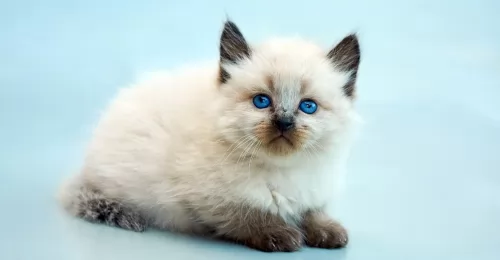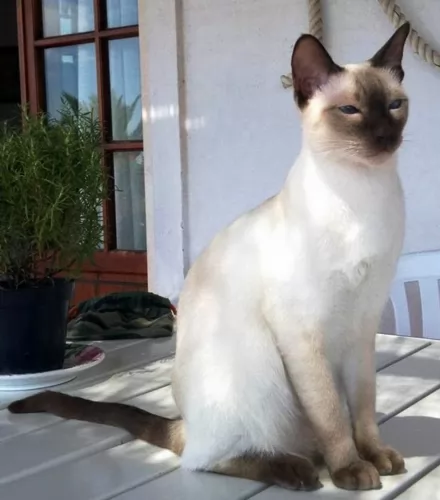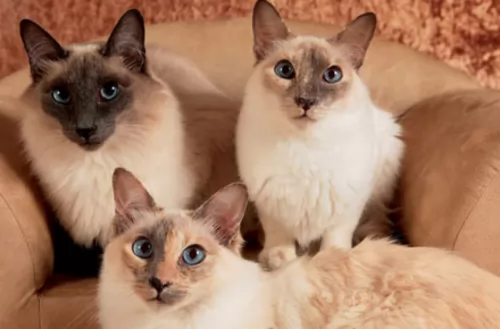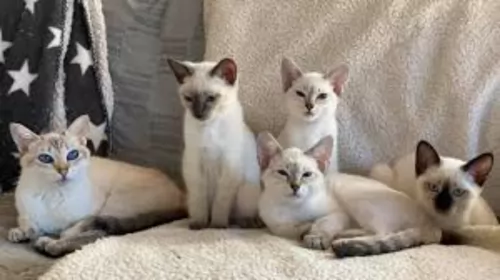 Petzlover
Petzlover Both Balinese and Thai are originated from Thailand. Both Balinese and Thai are having almost same weight. Both Balinese and Thai has same life span. Both Balinese and Thai has same litter size. Both Balinese and Thai requires Low Maintenance.
Both Balinese and Thai are originated from Thailand. Both Balinese and Thai are having almost same weight. Both Balinese and Thai has same life span. Both Balinese and Thai has same litter size. Both Balinese and Thai requires Low Maintenance.
 The slender Balinese cat is a cat similar in looks to the Siamese cat but fluffier. In fact, in the 1950s, Siamese breeders in the United States discovered that the kittens were fluffier than what a Siamese cat should be.
The slender Balinese cat is a cat similar in looks to the Siamese cat but fluffier. In fact, in the 1950s, Siamese breeders in the United States discovered that the kittens were fluffier than what a Siamese cat should be.
The fur was too long to conform to Siamese cat standards. Two Siamese breeders, Helen Smith and Marion Dorsey loved the look of the longer-haired Siamese with the idea being to name the breed the Longhair Siamese. Siamese breeders didn’t want this and the name became Balinese.
The Balinese cat has been recognized by many cat registries and associations.
 The Thai cat is also referred to as the Wichien Maat. It is an old cat breed descended from the cats of Thailand.
The Thai cat is also referred to as the Wichien Maat. It is an old cat breed descended from the cats of Thailand.
The Wichienmaat is a cat that was spoken of already centuries ago in a book. Over the years, the cat has remained much the same as its original breeding. Today this cat is popular in Thailand.
It was in the late 1800s that the Wichienmaat was imported to the West by British cat breeders, and the cats became known as ‘Siamese’.
Western breeders wanted to add in some other qualities to the cat and through selective breeding, they developed a finer-boned type of Siamese cat. Today some people refer to these cats as Old-Style Siamese, while others refer to them as Thais, but they are one and the same.
 The medium-sized Balinese has a long, slender, finely built body with the head being long and triangular.
The medium-sized Balinese has a long, slender, finely built body with the head being long and triangular.
The eyes of the cat are slanted and a deep blue.
The coat is medium in length and is soft and silky without an undercoat. The coat length is pretty much all that distinguishes this cat from the siamese cat. The coat is pointed which means you’ll find concentrations of color – cream, red and tortoiseshell on the face, ears, legs and the plumed tail.
Your Balinese is a talkative cat and he is active and playful too. Because it is such an intelligent cat, it can learn tricks too.
They are affectionate cats and bond closely with their human family. They crave lots of attention and don’t like being left alone for long periods of time. They’re chatty cats too and love to leap up onto high perches and look down on their world.
If you have a Balinese as a pet, you will certainly have to invest in climbing equipment.
 The Thai is a short-haired, glossy cat and comes in a variety of colors but no white.
The Thai is a short-haired, glossy cat and comes in a variety of colors but no white.
The soft, silky fur is a warm cream shade, much like the Siamese, with dark brown, black, smoky colored extremities.
The Thai is considered to be a medium-sized cat and he will weigh between 3 an 6kg. The body is lean, slender and muscular, the ears medium size with rounded tips and set wide apart. The eyes are are beautiful blue, large and slightly slanted.
Thai cats are curious, active, and intelligent. They are also social and vocal and are able to communicate to their human owners what they want.
They thrive on getting lots of attention from their humans and will even follow them around the house. They do well with children in the home when the children have been taught to be kind and respectful to animals.
 Your Balinese cat is a friendly, affectionate cat that will bond closely with his human family.
Your Balinese cat is a friendly, affectionate cat that will bond closely with his human family.
They’re the kind of cats that enjoy having their family members around them and they don’t like being left alone for long periods.
He is a playful cat so make sure that he has some nice toys that will keep him amused. They’re known for their intelligence and their inquisitive and playful natures, not to mention that these cats are easy on the eye as well.
Vocal and demanding, if you want someone who demands your friendship, then take a look at these beautiful Balinese cats.
 The Thai cat is social and friendly and enjoys time spent with his human family. They don’t like to be left alone for long periods of time and it just might be a good idea to have a feline friend for this cat.
The Thai cat is social and friendly and enjoys time spent with his human family. They don’t like to be left alone for long periods of time and it just might be a good idea to have a feline friend for this cat.
He is also a vocal cat and lets you know his feelings and certainly when he wants his food. The Thai wants to be your friend and companion and he will thrive in any kind of home when he is made to feel important and loved.
 Balinese cats are fairly healthy and any health problems these cats may have are much the same as those for the Siamese cat.
Balinese cats are fairly healthy and any health problems these cats may have are much the same as those for the Siamese cat.
You want to look at diseases such as respiratory illnesses, liver failure, dilated cardiomyopathy, and eye problems.
In fact, Progressive Retinal Atrophy is one health condition that you see quite a bit with the Balinese cat.
It can be an inherited eye disease or one that is acquired. PRA is a degenerative disorder of the retina and you will need to get your cat to the veterinarian. Unfortunately, there isn’t a treatment for PRA and therefore breeders need to check their breeding stock before allowing cats to be bred.
 These cats are known for their good health. Just because he is considered healthy, you can't ignore looking out for signs that he may be in distress.
These cats are known for their good health. Just because he is considered healthy, you can't ignore looking out for signs that he may be in distress.
There are actually a whole lot of common cat illnesses your cat could succumb to, so you want to be sure you recognize some of the signs such a vomiting, diarrhea, lethargy, and battling to urinate. Make sure that the eyes are always bright and clear and that he is his active self.
Have your Thai cat vaccinated against the deadly cat diseases that there are. You will also need to have your cat dewormed. Speak to your vet about the best way to prevent fleas.
 Your health depends on what you eat, and the same applies to cats too. Apart from good veterinary care for your cat, good food is of critical importance. A proper diet can eliminate veterinary expenses substantially.
Your health depends on what you eat, and the same applies to cats too. Apart from good veterinary care for your cat, good food is of critical importance. A proper diet can eliminate veterinary expenses substantially.
In feeding your cat, learn to read cat food labels and make sure your furry friend is getting the right amount of proteins, vitamins, and minerals.
There are many choices of cat foods – homemade and commercially manufactured cat foods which can be canned or you also get the dry cat kibble type of food.
If your furry friend doesn’t like a particular food, don’t punish him by taking it away and leaving him without food. Your mom tried you with different foods and you should do the same with your feline friend.
Provide your Balinese with ‘cat equipment’ - feeding and drinking bowls, grooming equipment and a nice, soft bed for him to lie in and in a quiet place.
Keep your pet’s vaccines up to date and see he gets to the vet when he is ill.
The Balinese has a coat of medium length and because the cat only really sheds seasonally, it is looked upon as a low-maintenance coat. A brush once a week will get rid of dust as well as loose, dead hair and keep the coat in good condition.
 You’ll see your Thai cat preening and grooming, but he will still need to have the silky coat brushed gently to keep it shiny and healthy.
You’ll see your Thai cat preening and grooming, but he will still need to have the silky coat brushed gently to keep it shiny and healthy.
The brushing will make him happy as he just loves the attention, and it is good for the cat’s fur – to remove dust and loose hairs.
Your Thai cat is a scratcher just like any other cat, and if you don’t want to have your furniture scratch, invest in a scratching post.
Examine the inside of your cat’s ears to make sure they are clear of dirt and wax that could cause infection.
Some people say you should brush your cat’s teeth, but this can be too traumatic for your cat. Pets have always done well without their teeth being brushed. It can frighten your cat so much, he’ll want to scratch you.
Your Thai is an active, energetic cat, and you will want to provide him with a cat tree for climbing.
Provide your cat with feeding- and drinking bowls, litter box, warm, soft bed and toys to keep him occupied. It is always a good idea to put a collar on your pet and an ID disc in case he runs away.